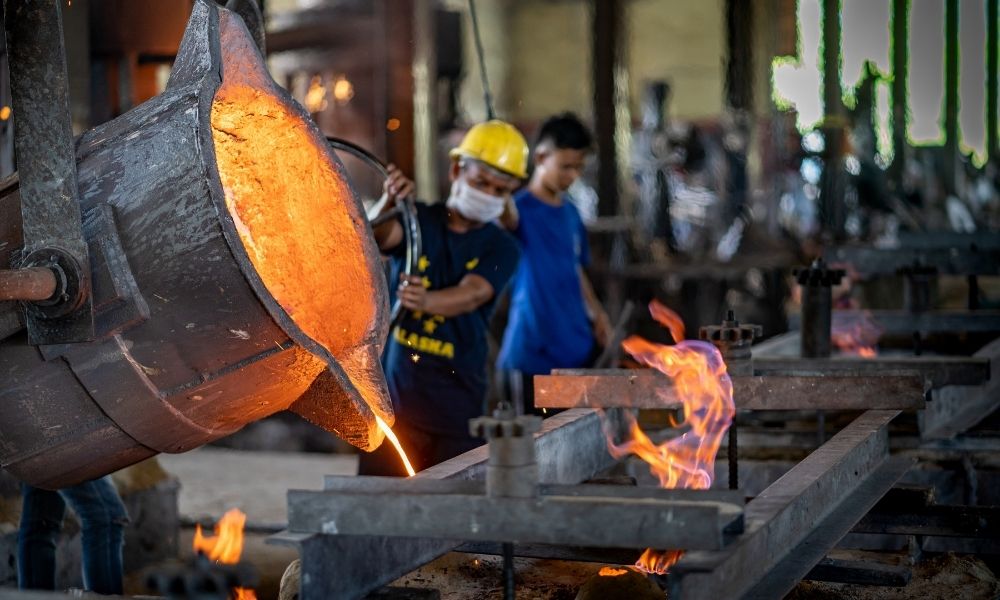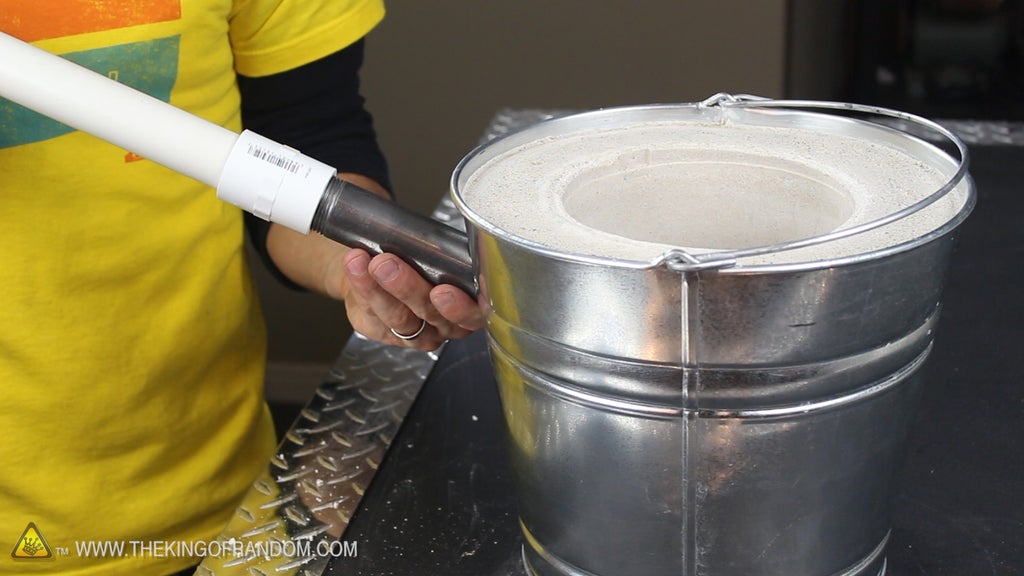Perfecting the Art of Aluminum Casting for Durability
Wiki Article
A Comprehensive Guide to Metal Casting: Benefits and Providers Used by Foundries
Metal casting is an important procedure in different markets, using countless advantages via the services of foundries. These facilities change molten metal into durable and specific components, catering to particular client demands. By utilizing sophisticated innovations, factories ensure top quality and performance in manufacturing. The ins and outs of metal casting and the diverse methods involved raise crucial inquiries regarding its function in contemporary manufacturing. What advancements lie ahead in this necessary field?Understanding the Metal Casting Process
The metal casting procedure is a fundamental method made use of in making to develop complex shapes and elements. This technique entails pouring liquified metal into a mold created to form the preferred object. The process starts with pattern creation, which serves as a design template for the mold and mildew. Aluminum Casting. Various products, such as sand, metal, or ceramic, are used for mold-making, relying on the particular requirements of the casting
As soon as the mold and mildew is ready, liquified metal is put right into it and allowed to cool and solidify. After solidification, the mold is eliminated, revealing the actors part. Various strategies, consisting of sand casting, financial investment casting, and die casting, are utilized, each matched to various applications and products. Quality control actions, such as evaluations and testing, are important to assure the end product fulfills requirements. On the whole, the metal casting process plays a vital duty in generating parts for sectors ranging from automotive to aerospace.
Trick Benefits of Metal Casting
Metal casting offers significant benefits that make it a favored manufacturing approach in different sectors. Its layout versatility and precision enable intricate shapes, while cost-effective mass manufacturing boosts performance. In addition, the convenience and strength of materials used in casting add to the sturdiness of the final products.Design Adaptability and Accuracy
Launching impressive layout adaptability and accuracy, metal casting allows designers and designers to create complex shapes and functions that would certainly be impossible or challenging to achieve with various other manufacturing approaches. This capability makes it possible for the production of intricate geometries, internal frameworks, and fine information that improve product functionality and looks. In addition, various casting methods, such as sand casting, financial investment casting, and die casting, give additional choices for modification, accommodating varied material homes and job requirements. The flexibility of mold and mildews permits adjustments during the design stage, enhancing the shift from principle to final item. Ultimately, metal casting attracts attention for its ability to supply high-precision parts, making it an indispensable procedure in markets varying from automobile to aerospace and past.Affordable Automation
Economical automation stands as one of the main benefits of metal casting, enabling suppliers to produce large amounts of parts at a lower cost each. This effectiveness arises from the ability to produce intricate molds that can be reused several times, significantly decreasing configuration and operational prices. In addition, metal casting processes, such as sand casting and die casting, enable high throughput, making it feasible to meet the demands of large-scale manufacturing runs. The reduced material waste and energy intake further improve price financial savings, making metal casting an attractive choice for markets needing bulk parts. In general, the cost-efficient nature of metal casting placements it as a favored approach for producers going for economic efficiency in their production processes.Material Adaptability and Strength
Among the standout characteristics of metal casting is its amazing material versatility, which enables for using a variety of alloys and metals. This adaptability makes it possible for makers to pick products that finest suit their certain applications, from light weight aluminum and bronze to iron and steel. Each metal uses unique buildings, consisting of differing degrees of toughness, rust resistance, and thermal conductivity. Metal casting can generate elements that fulfill rigorous efficiency requirements across varied industries, such as automotive, aerospace, and building. In addition, the strength of actors steels can be enhanced via various therapy procedures, guaranteeing toughness and longevity. Aluminum Casting. Overall, the combination of material convenience and fundamental strength makes metal casting a favored selection for creating premium elementsSorts Of Metal Casting Methods
Metal casting encompasses a variety of techniques that accommodate different manufacturing needs and material homes. Typical techniques include sand casting, which makes use of a sand mold for complicated shapes, and investment casting, known for its precision and surface coating. Pass away casting is one more technique that employs high-pressure injection of molten metal into mold and mildews, perfect for automation of little parts.Shell molding uses a much faster alternate, utilizing a resin-coated sand to produce thin-walled molds, while lost foam casting enables for intricate designs without the need for a core.
Additionally, continuous casting is utilized for creating lengthy sections of metal, such as sheets or bars, by solidifying liquified metal in a continuous procedure. Each method is and offers special advantages picked based on elements like the called for information, manufacturing quantity, and product kind, making certain premium outcomes in metal fabrication across different sectors.
The Role of Foundries in Metal Casting
Shops play a pivotal function in the metal casting process, acting as the centers where liquified metal is transformed into finished products. These specialized establishments are furnished with the essential tools and modern technologies to take care of various metals, ensuring top notch outcomes. Shops are in charge of numerous critical functions, including melting the metal, pouring it into mold and mildews, and allowing it to solidify.In addition, they preserve strict safety and security and environmental criteria to safeguard workers and lessen environmental effect. Competent technicians and designers collaborate to maximize casting processes, improving effectiveness and minimizing waste. Factories likewise take part in top quality control actions, guaranteeing that the last items fulfill particular resistances and specifications. This quality assurance is crucial for sectors that depend on exact components, such as automotive and aerospace. Because of this, shops contribute substantially to the overall manufacturing landscape, allowing innovation and development throughout numerous fields.
Customized Metal Casting Services
Custom metal casting solutions provide customized design solutions that meet details client needs. These solutions likewise supply material selection expertise, guaranteeing the ideal metal is chosen for the preferred application. Such versatility and understanding improve the general top quality and efficiency directory of the end product.
Customized Design Solutions
Customized layout remedies in metal casting offer producers with the adaptability to produce parts that satisfy certain efficiency and visual requirements. Shops provide tailored services that enable customers to define dimensions, shapes, and surface area coatings to accomplish wanted end results. This modification process commonly includes partnership in between designers and engineers, making certain that the final items align with operational requirements and industry criteria. Advanced modern technologies, such as computer-aided layout (CAD) and simulation software, allow accurate modeling and testing of parts before manufacturing, enhancing and reducing mistakes effectiveness. By leveraging tailored style remedies, organizations can maximize performance while decreasing waste and prices, eventually leading to an extra one-upmanship in the market. This adaptability is vital for industries requiring distinct applications and specifications.Material Selection Proficiency
When picking products for metal casting, competence plays a crucial role in making sure that the right option lines up with both efficiency demands and cost-effectiveness. Factories employ experienced specialists who comprehend the homes of different steels and alloys, allowing them to suggest suitable products for details applications. Aspects such as strength, rust resistance, and thermal conductivity are very carefully taken into consideration to meet the customer's needs. Furthermore, market patterns and improvements in material scientific research educate these decisions, allowing shops to remain competitive. view it now By leveraging their competence, factories can assist customers in steering with complicated material options, inevitably resulting in enhanced item high quality and decreased production costs. This specialized expertise is crucial for achieving successful outcomes in custom metal casting solutions.Quality Assurance in Metal Casting
Quality control in metal casting is essential to guarantee that the end products satisfy the called for specifications and performance standards. Shops employ a selection of techniques and techniques to assure the best of cast parts. This procedure begins with strict product examinations, confirming that resources abide by industry requirements. Throughout the casting procedure, real-time surveillance and screening are carried out to examine criteria such as temperature level, mold and mildew integrity, and dimensional accuracy.
Applications of Metal Castings Throughout Industries
Metal spreadings play an important duty in different industries, serving as the backbone for numerous applications. In the vehicle market, cast parts such as engine blocks and transmission housings are necessary for lorry efficiency and reliability. The aerospace market depends on accuracy castings for essential elements that ensure safety and security and performance in trip. Additionally, the building and construction sector utilizes metal spreadings for components, installations, and structural components, enhancing the durability of buildings and framework.Moreover, the power market take advantage of spreadings utilized in turbine blades and various other equipment necessary for power generation - Metal Casting. The medical field also utilizes metal spreadings in devices and tools, showing the versatility of this manufacturing procedure. Generally, metal castings are essential to the functionality and advancement of diverse fields, showcasing their significance in modern technology and facilities advancement
Frequently Asked Questions
What Materials Are Typically Made Use Of in Metal Casting?
Common products used in metal casting consist of light weight aluminum, iron, brass, steel, and bronze. Each product provides distinct buildings appropriate for various applications, permitting suppliers to select the most effective alternative based on deterioration, weight, and stamina resistance.The length of time Does the Metal Casting Refine Generally Take?
The metal casting process typically takes numerous hours to a few days, depending on factors such as the intricacy of the layout, kind of metal made use of, and the specific casting method employed by the factory.
What Is the Ecological Effect of Metal Casting?
The environmental impact of metal casting consists more information of energy intake, discharges, and waste generation. Foundries often execute actions to reduce these impacts, such as reusing materials and using cleaner innovations to reduce their eco-friendly impact.Can Metal Casting Be Provided For Small-Scale Projects?
Metal casting can without a doubt be carried out for small-scale jobs. Different shops deal with such requirements, using personalized options that suit limited production runs while keeping high quality and accuracy in the final products.What Are the Precaution in Metal Casting Foundries?
In metal casting foundries, precaution consist of individual safety tools, proper air flow, training on devices usage, emergency treatments, regular upkeep checks, and adherence to sector security criteria to minimize threats related to liquified metal and hazardous materials.Additionally, metal casting procedures, such as sand casting and pass away casting, allow for high throughput, making it possible to satisfy the needs of large-scale production runs. One of the standout features of metal casting is its exceptional product versatility, which permits for the use of a wide range of alloys and metals. Additionally, constant casting is utilized for creating lengthy areas of metal, such as bars or sheets, by solidifying molten metal in a continuous procedure. Foundries play a critical duty in the metal casting procedure, serving as the facilities where molten metal is transformed right into completed items. Typical products made use of in metal casting include aluminum, iron, steel, brass, and bronze.
Report this wiki page